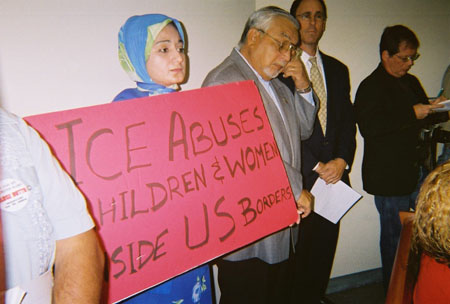 SEC Special Report: The meat packing industry is the largest segment of the U.S. Agriculture industry producing close to 100 billon pounds of meat and poultry in 2004 with sales that exceeded 100 billion dollars. The Top 5 companies are: Tyson, Conagra, Smithfield, Swift and Hormel. This industry is highly concentrated to just a few top players.
SEC Special Report: The meat packing industry is the largest segment of the U.S. Agriculture industry producing close to 100 billon pounds of meat and poultry in 2004 with sales that exceeded 100 billion dollars. The Top 5 companies are: Tyson, Conagra, Smithfield, Swift and Hormel. This industry is highly concentrated to just a few top players.Since 1980, the number of slaughter plants has plunged from more than 600 to 170 cattle slaughterers. Since 1980, the number of hog slaughter plants has been reduced from more than 500 to 180. The number of processing plants has also been decreasing. Most of the closed plants were small facilities. Smaller operators who do not have a special market niche cannot compete with the predatory practices of the big operators and the huge advantages that come with the economy of scale both in the purchase of live animals and every day plant production operations.
From the 1950s through 1984, meat packing was one of the highest paying industries in U.S. manufacturing. From 1984 until the present, meat packing has dropped to one of the lowest paying. Contract concessions have taken UFCW from its strongest bargaining position to its weakest. Meat packing was also one of the most highly organized industries in U.S. manufacturing; however, the percent of union workers in this industry has plunged from 80 percent in 1980 to less than 50 percent today. In right-to-work states such as South Dakota , Texas , Kansas , Nebraska and Iowa where there are large numbers of packinghouse workers, union membership on a plant by plant basis ranges from only 10 to 30 percent in many plants.
Today, the wages/benefits are at an all time low and workers are mistreated, forced to work under the most hazardous/unsafe conditions in the nation. In 2004, Human Rights Watch issued a report concluding the nation's meat packing industry violates basic human and worker rights.
TN Magazine Concurs: Since the 1980s, a few corporations have controlled meatpacking, and they have maintained their narrow profit margins by hiring non-union, immigrant labor and pushing fewer workers to work faster. It's gruesome, hazardous work, with 36% of meatpacking employees injured on the job every year. That figure does not include meatpacking's most imperiled workers: the contract employees who rush to clean blood-slick surfaces and equipment, often ignoring safety protocol, and at high risk for crushing, amputation and chemical exposure. Plants that once cleaned in-house have cut costs by outsourcing to contractors like QSI, whose crews must scour massive slaughterhouses to USDA specifications in a few hours. According to meatpacking industry expert Julie Eisenberg, contract cleaning is a "hidden industry"—new enough that OSHA still classifies its workers as janitors. And those workers are usually immigrants, often undocumented, and desperate enough to accept the hard work and poor wages commensurate with winning the low bid.
In 2007, two low-level QSI managers were scheduled for sentencing, guilty of hiring and providing stolen identities for illegal immigrants at an Illinois meatpacking plant. The managers were among 62 QSI employees—over half of QSI's workforce there—arrested in a raid by Immigration and Customs Enforcement. While the Vincit Group declined comment, the arrests highlight the problems inherent for a business created from and caught up in the ills of the industry it serves.
QSI is a subsidiary of The Vincit Group. This privately held industrial sanitation company was preparing to move into Brabson Place, a new, $15 million headquarters it co-owns along with Wolford Development and which anchors a key corner in downtown Chattanooga. The stately building symbolizes success for a business that began in 1968 as Zee Company, maker of industrial cleaning agents. Now Zee is one of The Vincit Group's five "vertically integrated" subsidiaries primarily serving meatpacking plants; its flagship, QSI, is thought to earn $10 to $20 million annually, staffing and managing cleaning crews for industry leaders like Cargill, Smithfield and Tyson.
Lance Compa, lecturer in labor law at Cornell University, says if contractors' top brass don't know about undocumented workers, it's because they "don't want to know," insulating themselves from lower-level management. But in 2003, when QSI employees at a North Carolina pork processing plant threatened a walkout, top management was on the scene. The National Labor Relations Board later found QSI guilty of assaulting the workers and threatening them with deportation.
 Readers, What are your thoughts? What are the Implications?
Readers, What are your thoughts? What are the Implications?

 I am receiving several reports that businessess in locations that have imposed tough Immigration Laws are going out of business. Here are some examples:
I am receiving several reports that businessess in locations that have imposed tough Immigration Laws are going out of business. Here are some examples:
 Reader Question:
Reader Question:

 Neighbors in rural Waller County said they thought a top-secret military venture was under way among the farmland and ranches, some 70 miles northwest of Houston. KPRC Local 2 Investigates had four hidden cameras aimed at a row of mysterious black trucks. Satellite dishes and a swirling radar added to the neighbors' suspense.
Neighbors in rural Waller County said they thought a top-secret military venture was under way among the farmland and ranches, some 70 miles northwest of Houston. KPRC Local 2 Investigates had four hidden cameras aimed at a row of mysterious black trucks. Satellite dishes and a swirling radar added to the neighbors' suspense.




























